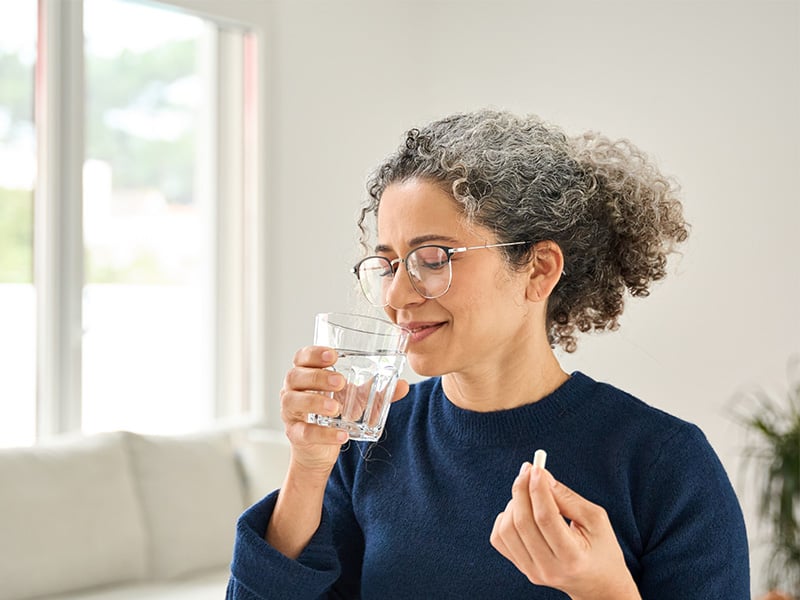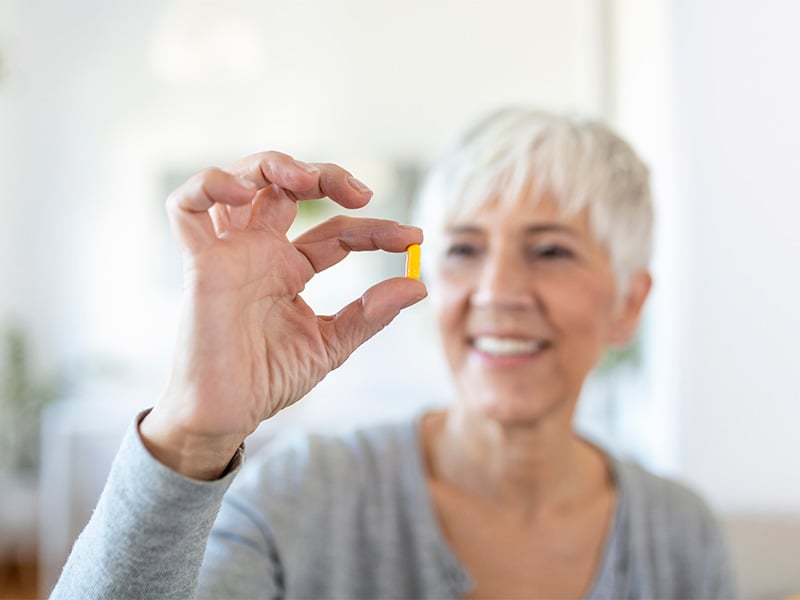
Statins – your questions answered
Whether you’re taking statins or considering whether to take them, you may have questions about this cholesterol-lowering medication.


We asked you what you want to know about statins, and Professor Darrel Francis, Professor of Cardiology at Imperial College London, has helped us answer some of your most common questions.
If you have questions about statins or your treatment, it’s also important to talk things through with your doctor or a pharmacist.
What's on this page?
- How will taking a statin help me?
- Are statins safe?
- What is a low dose statin?
- Would I be offered a statin without having my cholesterol checked?
- Can I stop taking a statin once my cholesterol is lower?
- When should I take my statin?
- Can I drink alcohol while taking statins?
- Can I have grapefruit while taking statins?
- What can I do about side effects? Muscle pain, sleep and weight changes
- Are there alternatives to taking statins?
- Can I donate blood if I’m taking a statin?
How will taking a statin help me?
Statins help lower the cholesterol level in your blood. This helps lower your risk of heart and circulatory conditions, such as:
- coronary heart disease and angina (chest pain and discomfort)
- heart attack
- stroke.
Professor Darrel Francis explains they are a preventative medicine, “people often don’t want to take medicine when they feel healthy,” he says. “But you could think about it like other healthy life choices, for example, choosing not to smoke to protect your health, or wearing a seatbelt to protect you in case of an accident.”
Think about it like other healthy life choices, for example, choosing not to smoke to protect your health
Professor Darrel Francis
Professor of Cardiology
- Find more information on statins and how they work.
Are statins safe? They seem to get a lot of negative press
Statins are one of the most researched drugs, and there’s lots of reliable evidence showing they’re very safe and effective to take. This includes research funded by the British Heart Foundation.
It’s important to find information that’s evidence-based and from a trusted source, such as the NHS and the British Heart Foundation. If you're unsure speak to your doctor, they can discuss it with you.
Read about statins research and information on the myths and facts of statins.
What is a low dose statin?
In the UK there are 5 statins available on prescription:
- atorvastatin
- fluvastatin
- pravastatin
- rosuvastatin
- simvastatin.
Some statins are stronger at lowering your cholesterol than other statins at the same dose. For example, 10mg of atorvastatin has a stronger cholesterol-lowering effect than 10mg of simvastatin.
You might hear about low dose statins you can buy over the counter, meaning you don’t need a prescription. However, it’s important to talk to a doctor or pharmacist before taking a statin so they can check if it’s suitable for you and to see if you need regular check-ups.
Want to get fit and healthy?
Sign up to our fortnightly Heart Matters newsletter to receive healthy recipes, new activity ideas, and expert tips for managing your health. Joining is free and takes 2 minutes.
I’d like to sign-upWould I be offered a statin without having my cholesterol checked?
When deciding whether you should take a statin or not, your doctor will look at your overall risk of having a heart attack or stroke in the future. They use calculations to work out your individual risk, including information on:
- your age
- your sex
- whether you smoke
- if you have diabetes
- your blood pressure.
In most cases your cholesterol will be checked before you start taking a statin. However, if your overall risk of having a heart attack or stroke is high, a statin may be recommended without a cholesterol check. This is because if your risk is high, a statin can help reduce your chances of a heart attack or stroke regardless of your cholesterol level.
If you have a heart attack and are not taking a statin, it’s normal to start them when you’re admitted to hospital. This will help reduce your risk of having another heart attack. In this case, the doctor will often give you a statin before checking your cholesterol level.
Can I stop taking a statin once my cholesterol is lower?
Most people prescribed a statin will take it for life. This is because statins reduce your risk over your lifetime, and as you get older the benefit increases because your chance of having a heart attack or stroke goes up.
It can be difficult to understand why you need to continue taking your statin once your cholesterol is lower. It may feel like the medicine has done its job. However, once you stop taking the statin your cholesterol will usually go up again.
When should I take my statin?
People are often told to take their statin at night, because some statins work better when taken at this time. If you make it part of a routine, you’re more likely to remember it. You could take it when getting ready for bed, before or after brushing your teeth.
If you make it part of a routine, you’re more likely to remember it
The most important thing is to take your statin at a time that works for you if this means you’re more likely to remember to take it. For example, by taking it with your other medicines.
Can I drink alcohol while taking statins?
Most people can continue drinking alcohol while taking a statin if they chose to. But people who regularly drink a large amount have an increased risk of side effects and liver problems.
Also, if you’re prescribed a statin it’s because your risk of a heart condition, such as heart attack or stroke, is higher. This means you should make healthy lifestyle changes alongside taking a statin, including limiting how much alcohol you drink. It’s recommended to have less than 14 units per week.
Can I have grapefruit while taking statins?
You may be told to avoid eating and drinking grapefruit while taking certain statins. This is because it can increase the amount of statin in your blood, which can increase the risk of side effects.
Do not eat or drink grapefruit if you're taking simvastatin. If you take atorvastatin, you can have grapefruit and grapefruit juice, but have it only occasionally and not a large quantity. If you take another type of statin, grapefruit is not thought to be a problem.
- Do you know the truth about statins? Take our statin quiz.
What can I do about side effects?
Most people taking statins don’t experience any side effects. However, for some people side effects can have a big impact on their daily life.
Side effects can be different depending on the statin you’re taking. If side effects are affecting you, speak to your doctor about your symptoms. They can help to find out what’s causing your side effects and help you manage them. For example, if the side effects continue your doctor may reduce your dose or change your statin.
If side effects are affecting you, speak to your doctor
Side effects may be caused by the statin but could also be caused by other things such as stress, tiredness, or a change in your lifestyle. If you’ve started taking statins recently it’s worth bearing in mind that symptoms with any new medicine may improve over time or even disappear.
The decision to stop taking a statin is an important one, and it’s essential to think about what it means for you.
It's important to talk to your doctor if you're thinking about stopping your statin.
You told us the side effects you worry about include muscle pain, feeling tired and not sleeping and weight changes.
Muscle pain and statins
The most common side effect reported is muscle pain, weakness or cramps. This can have an impact on your day-to-day life, and it’s important to tell your doctor if you experience this.
If muscle pain is affecting you, your doctor can help to find out what’s causing your side effects and help you manage them.
These tips may help you manage pain:
- gently stretch your muscles regularly
- take a painkiller, such as paracetamol ibuprofen (ask your pharmacist if you can take it with your other medicines)
- have a warm bath with bath salts to soothe your muscles
- alternate between ice packs and warm water bottle
- ask your doctor to refer you to a physiotherapist.
You can find more information about reducing pain on the NHS website.
Sleep and tiredness
Lack of sleep can have a big impact as you can feel more tired and find daily tasks harder. This can have a big impact as you can feel more tired and find daily tasks harder.
If you’re struggling to sleep, try our sleeping tips or get in touch with The Sleep Charity for support to sleep better.
- Read about research on statins and sleep.
Weight changes
Although uncommon, some statins have been linked with a small amount of weight gain. However, the benefits of taking a statin far outweigh this potential side effect.
It’s important to maintain a healthy weight while taking your statin, to help protect your heart. If you’re concerned about weight changes, you can find lots of helpful tips on taking control of your weight on our website.If you’re worried about any other side effects speak to your doctor. You can also find trusted information on statin side effects.
Read more about research into the side effects of statins.
Are there alternatives to taking statins?
If your doctor has recommended a statin, it’s because it’s the most effective way to reduce your risk and lower your cholesterol.
They may also recommend other ways to lower your cholesterol while taking your statin, such as:
- maintaining a healthy weight
- staying physically active
- following a healthy diet
- not smoking.
People often ask about plant sterols and stanols, which are found naturally in certain foods and are also added to some foods. These aren’t a replacement for medications as, although they can lower your cholesterol as part of a healthy, balanced diet, it’s not known whether they reduce the number of heart attacks and strokes.
Alternative treatments are sometimes used when you’re unable to take a statin or if your cholesterol isn’t well controlled with a statin. You may hear about:
- ezetimibe
- bempedoic acid
- PCSK9 inhibitors.
Some of these alternative treatments may only be prescribed by a specialist.
Talk to your doctor or pharmacist if you want to understand more about the medicine you have been prescribed.
Can I donate blood if I’m taking a statin?
You may be able to donate blood if you’re taking a statin.
This will depend on:
- what, if any, health condition you have
- if you’re waiting for any health tests or investigations
- how long you’ve been taking statins for
- whether you feel well on the day of donation.
Speak to NHS Blood and Transplant to talk it through and find out if you can donate.
Thank you to everyone who submitted questions about statins. If you have specific questions about your medicine and treatment, please speak to your doctor. You can also call our Heart Helpline to talk to one of our cardiac nurses.
What to read next...
Reduce your cholesterol

More useful information
How do statins reduce the risk of a heart attack?

Can statins lower dementia risk?





